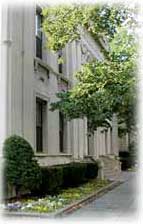 |
Who Yale HonorsBerkeley
College |
Woodbridge Hall Timothy Woodbridge is the only one of the original ten Yale trustees to have a building named after him. This is somewhat ironic, for Woodbridge was among the minority that staunchly opposed locating the college in New Haven; he even refused to attend commencement ceremonies in New Haven, and tried unsuccessfully to maintain his own alternative college elsewhere. (The original trustees selected Abraham Pierson as Yale's first rector, and Pierson does have a residential college named in his honor.) Timothy Woodbridge owned "an Indian boy and some negro slaves" (4). Slavery underpinned many facets of colonial New England, from the household to the field, from the legal system to religious education. Many were the slaves working in colonial houses as domestic servants, cooking, raising colonists' children, raising livestock, sowing and harvesting. Although large cotton slave plantations would not dominate the South until Eli Whitney (Yale 1792) invented the cotton gin at the turn of the century, the institution of slavery permeated New England as well as the South during colonial times. For example, both John Davenport and Jonathan Edwards, colonial ministers each, owned slaves. |
|
 Yale
was founded by colonial clergy.
Yale
was founded by colonial clergy.